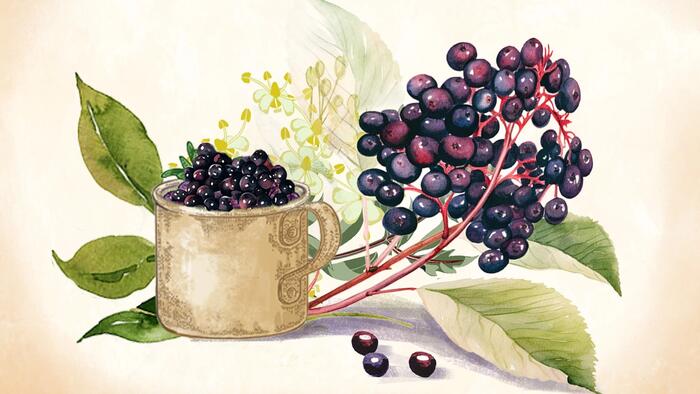Elderberry, derived from the elder tree (Sambucus nigra), has served as a revered remedy throughout history, particularly for various respiratory infections, inflammation, and fever. Its use dates back thousands of years, as evidenced by historical findings of elderberry remnants in ancient settlements, suggesting that elder trees may have been consciously cultivated. Renowned in traditional medicine, elderberry has been employed to treat numerous ailments, including diabetes, skin issues, and respiratory conditions. The famed Greek physician Hippocrates referred to elderberry as his “medicine chest,” recognizing its diverse healing properties. Additionally, various cultures have utilized elderberry for a multitude of purposes, from medicinal applications to crafting musical instruments, attesting to its multifaceted significance.
Modern recognition of elderberry’s medicinal benefits surged during the 1995 Panama flu epidemic, as it became a popular treatment option. Clinical trials revealed that nearly 90 percent of patients who received elderberry extract for the flu recovered more quickly than those given placebo treatment. This resurgence of interest in elderberry translates into a growing body of research underscoring its efficacy in treating respiratory illnesses. In contemporary settings, elderberry is consumed in various forms, such as jams, jellies, and beverages, demonstrating its enduring popularity.
From a nutritional perspective, elderberry is celebrated as a “superfruit” due to its rich blend of vitamins, minerals, and antioxidants, particularly anthocyanins, the compounds that impart its dark hue. These antioxidants play a crucial role in shielding the body from oxidative stress and inflammation, two critical factors linked to immune system dysfunction. Elderberry’s diverse nutrient profile includes vitamins A, B-complex, C, and E, as well as minerals like zinc and magnesium, contributing to its reputation as a potent ally in the fight against various diseases, including chronic conditions such as atherosclerosis.
Recent studies highlight the potential of elderberry in alleviating cold and flu symptoms, with an average reduction of illness duration by four days in clinical trials. This is attributed to its mechanism of action, which involves blocking viral proteins to hinder virus-related infection. Additionally, elderberry has demonstrated promise in cognitive health, with research indicating that its antioxidative properties may help mitigate cognitive decline associated with conditions such as Alzheimer’s disease. Studies have shown improvements in problem-solving abilities and reductions in inflammation markers among older adults consuming elderberry, signifying its neuroprotective potential.
Emerging research also suggests elderberry’s role in combating chronic diseases, with studies focusing on its effects on heart disease, diabetes, and cancer. While some findings imply a positive correlation between elderberry consumption and improvements in heart health—indicated by cholesterol level reductions—further research is needed to substantiate these claims in humans. In diabetic models, elderberry has been observed to improve insulin sensitivity and lower fasting blood sugar levels. Furthermore, its bioactive compounds, particularly kaempferol, have demonstrated the ability to induce the death of cancer cells in laboratory studies, establishing elderberry as a substance of interest in cancer prevention and treatment strategies.
In summary, elderberry’s historical use as a therapeutic remedy is supported by modern scientific research underscoring its extensive health benefits. Its role in treating acute respiratory conditions, complimented by its preventative capabilities against chronic diseases, showcases elderberry as a versatile natural remedy. Both traditional and contemporary perspectives highlight the plant’s significant health-promoting properties, reinforcing its standing as a valuable element in herbal medicine and nutritional supplementation. Continued research will further clarify the full extent of elderberry’s health benefits, cementing its place in the landscape of natural remedies.

